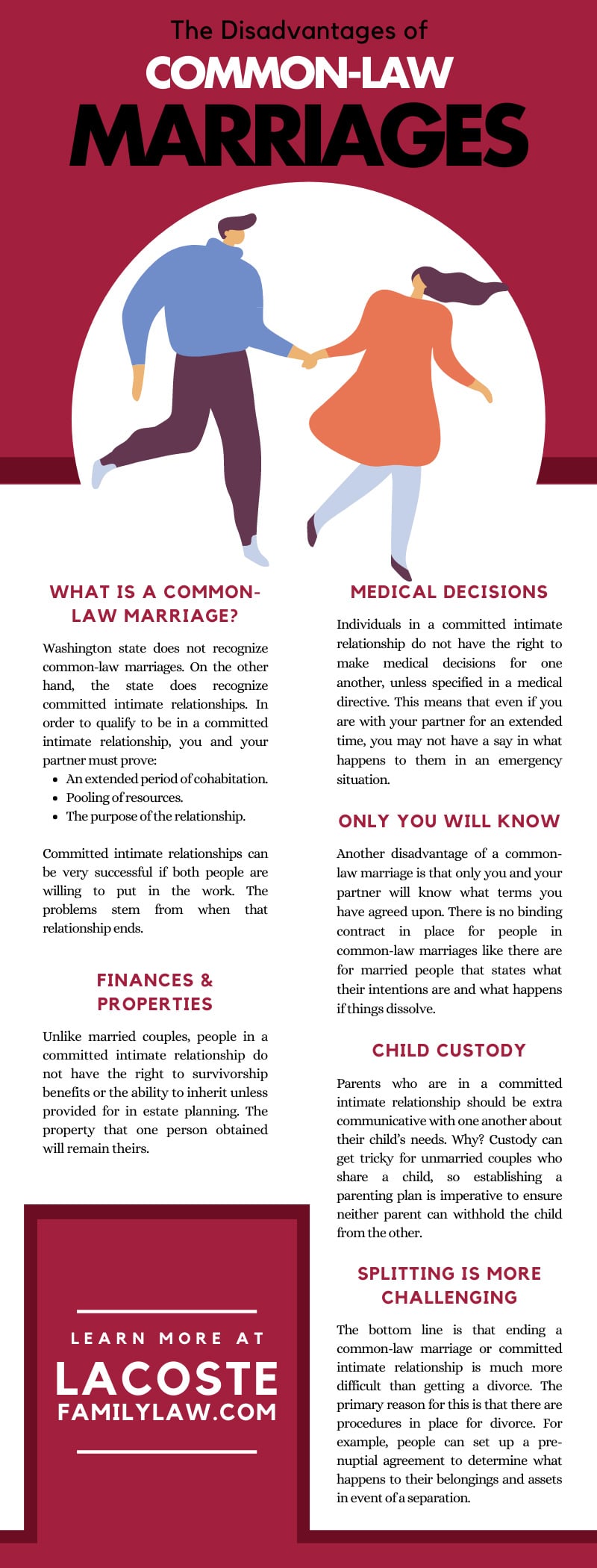
30 Jun The Advantages and Disadvantages of Common Law Marriages
Marriage is not for everyone. Sometimes, a couple does not feel the need to legalize their union through a ceremony. This could be for religious reasons or not wanting to spend a ton of money on a wedding. However, it is important to note that even couples who do not get married can have their relationships recognized by some states as long as they meet the necessary requirements. Everyone should know that there are both advantages and disadvantages of common law marriage. The disadvantages usually outweigh the advantages of common-law marriage (or what is also known as a committed intimate relationship). This article will discuss those issues as well as some solutions for couples in this situation.
What Is a Common-Law Marriage?
Washington state does not recognize common-law marriages. On the other hand, the state does recognize committed intimate relationships. In order to qualify to be in a committed intimate relationship, you and your partner must prove:
- An extended period of cohabitation.
- Pooling of resources.
- The purpose of the relationship.
Committed intimate relationships can be very successful if both people are willing to put in the work. The problems stem from when that relationship ends. The remainder of this article will discuss the disadvantages of common-law marriages, so people know how tricky it is to get out of one.
Finances & Properties
A significant difference between common law marriage vs. marriage is that, unlike married couples, people in a committed intimate relationship do not have the automatic right to survivorship benefits or the ability to inherit unless provided for in estate planning. Big ticket items both purchased and with loans, such as homes and cars are separate in nature unless paid for with joint funds, to which the relationship then changes. The property that one person obtained will remain theirs. The same is true of any debts that one person accrued by themselves throughout the coupling.
This rule applies to property as well. The property will remain in whoever’s name is on the deed or lease. This means that if one person chooses to move into their partner’s home at some point in the relationship, the property would still remain their partner’s nam, however once incomes or funds are comingled, each partner is entitled to equity earned while cohabitating.
Medical Decisions
Individuals in a committed intimate relationship do not have the right to make medical decisions for one another, unless specified in a medical directive. This means that even if you are with your partner for an extended time, you may not have a say in what happens to them in an emergency situation. Medical decisions are definitely a conversation that couples should have when discussing the advantages and disadvantages of common law marriage, or in Washington, a committed intimate relationship. Weighing marriage pros and cons and deciding whether to marry or not involves issues like this that you may not have considered previously. You may want to cement your relationship in the law’s eyes if you want a say in what happens to your partner during a medical emergency.
Child Custody
Parents who are in a committed intimate relationship should be extra communicative with one another about their child’s needs. Why? Custody can get tricky for unmarried couples who share a child, so establishing a parenting plan is imperative to ensure neither parent can withhold the child from the other. In a previous blog post, we discussed how judges determine what is in the best interest of the child during divorce proceedings. Here are a few key highlights from that article:
- The parent must be able to provide the child with a stable environment.
- The parent should be able to support the child financially.
- The child’s life must not be totally disrupted by the separation.
Now, if both parents can provide all of these things, that is when the courts step in. For instance, a judge will listen to testimony from people advocating for both sides. The point is that all of this can get messy rather quickly, so it is best to have an attorney by your side throughout the process.
The team at LaCoste Family Law knows that fathers in an unmarried situation typically feel they get treated unfairly when it comes to child custody. That is why we work tirelessly to prove that both parties play a significant role in their children’s lives. We have one of the best common law lawyers in Washington State on our team, and we want to make sure both parents get the time they deserve with their child.
Only You Will Know
Another disadvantage of a common-law marriage is that only you and your partner will know what terms you have agreed upon. There is no binding contract in place for people in common-law marriages like the formal, legal commitment that exists for married people who have made their intentions clear by making their union official in the eyes of the law—such that rules pertaining to community property and pooled finances automatically apply. Even in a committed intimate relationship, there is no legal framework that states what their intentions are and what happens if the relationship dissolves. Rather, only you and your partner will know what you have agreed when you choose common law marriage vs. marriage. So, if things turn ugly, one person can say they never agreed to something the other person knows they did.
Splitting Is More Challenging
The bottom line is that ending a common-law marriage or committed intimate relationship is much more difficult than getting a divorce. The primary reason for this is that there are procedures in place for divorce. For example, people can set up a pre-nuptial agreement to determine what happens to their belongings and assets in event of a separation. Also, divorces are more common, so judges and attorneys are a little more familiar in dealing with these cases as opposed to something that is not set in stone.
Again, marriage is not for everyone. Certainly, no one is demanding that couples in committed relationships get married right now. However, it is important to weigh the options before shooting down marriage entirely. Legally, it is much easier to be married than it is to be in a committed intimate relationship. You will have documentation that states the things you purchased when you were together belong to you both.
In addition, everyone will know about your agreements and commitment if you decide to get married. There is no law requiring that people in committed intimate relationships document what they want if the coupling ends. Finally, people who are married get to make medical decisions for one another and have more rights when their partner dies. The last thing you want when going through a grieving period is to be told you have no rights because you were never married. So, call LaCoste Family Law if you are ending your committed intimate relationship. We will start to lay the groundwork for what your life looks like after the coupling ends.


